Bought yourself a beautiful composite sink but now worried about how to clean it without damaging it? Are there ways to clean composite sinks without spending too much? Yes, there are. The best feature is that composite sinks provide ease of cleaning.
In fact, apart from easy cleaning, composite sinks are made from hard-wearing stone and high-tech composites which makes them durable, stain-resistant, and long-lasting.
However, composite sinks also wear off from heavy use, like any other sink material. Often, they tend to develop hard water stains, minor scratches, and food stains that require a little elbow grease.
To be precise, composite sinks are available in two kinds -quartz and granite composite sinks. So, are there different cleaning methods for both -quartz and granite? No, the good news is that both the sink types have the same cleaning methods mentioned in this article.
This article mentions some of the most effective and safe cleaning methods you can use to clean your composite sinks at home. But first, let us understand the sink material before getting into the specifics.
Composite sinks -In brief
As implied by the name, composite sinks are a composition of natural stones and resins. In general, in creating a high-quality composite sink, the manufacturers combine natural stones like quartz, granite, and other materials which offer the sinks resistance to heat, stains, and scratches.
Due to the natural stone, composite sinks come in a wide range of colors, including the ever-popular black and white. Composite sinks are created under extreme pressure making them non-porous resistant to scratches, chips, and stains.
Additionally, composite sinks are preferred by homeowners because they get an alluring appeal and beneficial qualities without spending a fortune. Mainly, these sinks are made of quartz and granite.
Quartz Composite Sink
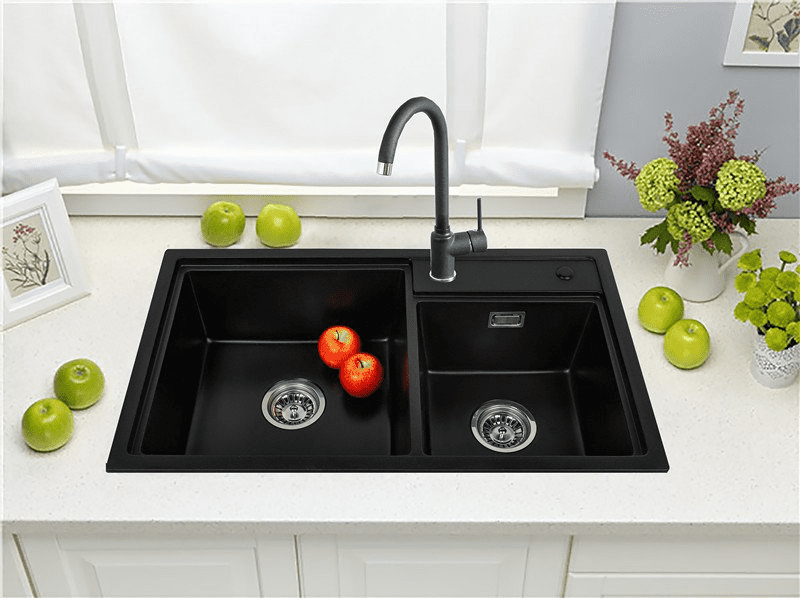
For a quartz composite sink, 80% of crushed quartz sand is combined with 20% of acrylic resin. The acrylic resin particles act as binding agents for the solid materials providing strength and flexibility to the sink and making them unlikely to crack.
Besides, to our surprise, quartz sinks are lighter than cast iron but more durable than stainless steel.
Granite Composite Sinks
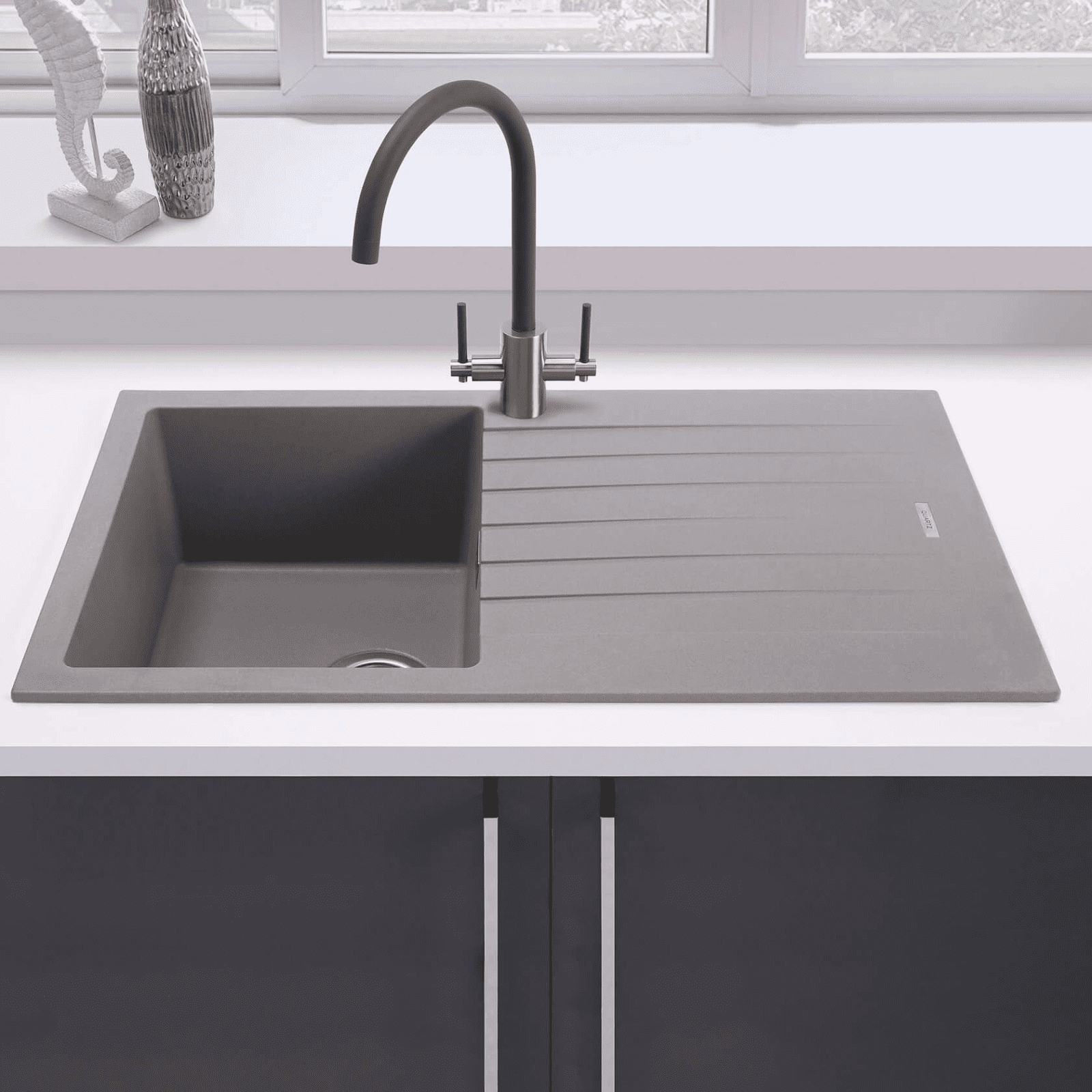
Essentially, a granite composite sink is identical to a quartz composite sink. The difference lies in the base material. In this case, the sink has 80% granite, and the remaining 20% is acrylic resin.
Now, we are familiar with the composition of the sink. So, let us get down to business and discuss simple, DIY methods for cleaning a granite sink.
Note -These methods are limited to cleaning composite sinks and not pure quartz or pure granite sinks.
Ways to Clean a Composite Sink
Know that cleaning a white composite sink is different from a colored sink. The only drawback of having a white sink is that it often gets stained and needs cleaning regularly.
But, be mindful as to what products you use on your white sinks. Also, the key to keeping your white sinks shiny is daily cleaning.
For White Composite Sinks
There are two easy ways to clean white composite sinks.
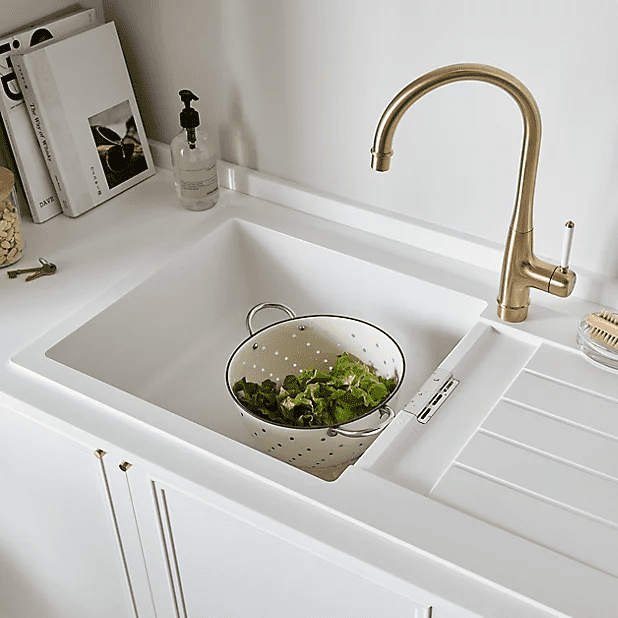
Warm Water and Dishwashing Soap
- Take some warm water -(not boiling) and add dish soap to it.
- Now, dip a soft cloth into the hot soapy water.
- Gently scrub the sink.
- Wipe and clean the sink thoroughly.
- You can also use non-abrasive scrubbers to scrub the sink.
Tip –For best results, use this method to clean the composite sink after every use.
Hot Water and Vinegar Solution
The above method might get rid of light stains from the white surface. However, use hot water and vinegar if staining is persistent and settled.
To get results,
- Make a solution using hot water and vinegar in equal amounts (50/50)
- Pour this solution into the stained white sink.
- Brush the stains away with a nylon brush or soft-bristle brush.
- After a minute of scrubbing, use clean water to rinse.
- Wipe the sink dry once the stains are gone.
Caution -Do not use vinegar directly onto the surface as it can damage the protective layer of the sink.
Routine Cleaning
Composite sinks are easy to clean, only when cleaned regularly. For routine cleaning, use the soap water method. This method is effective for white as well as colored sinks.
Soap Water Solution
To regularly clean your sink,
- Heat some water and add your favorite dish soap to it.
- Pour this solution into the sink, and using a lint-free cloth, gently scrub the sink.
- Once done, rinse the soap water using clean water.
- Now, wipe the sink dry with a microfiber towel.
It is better to clean the sink daily than to use infrequent ‘heavy’ cleaning.
However, regular cleaning may not help clean tough stains and hard water stains. Hence, we will discuss solutions to each of these problems further.
For Cleaning Stains
To clean light stains from a composite sink, use the combination of baking soda with vinegar.
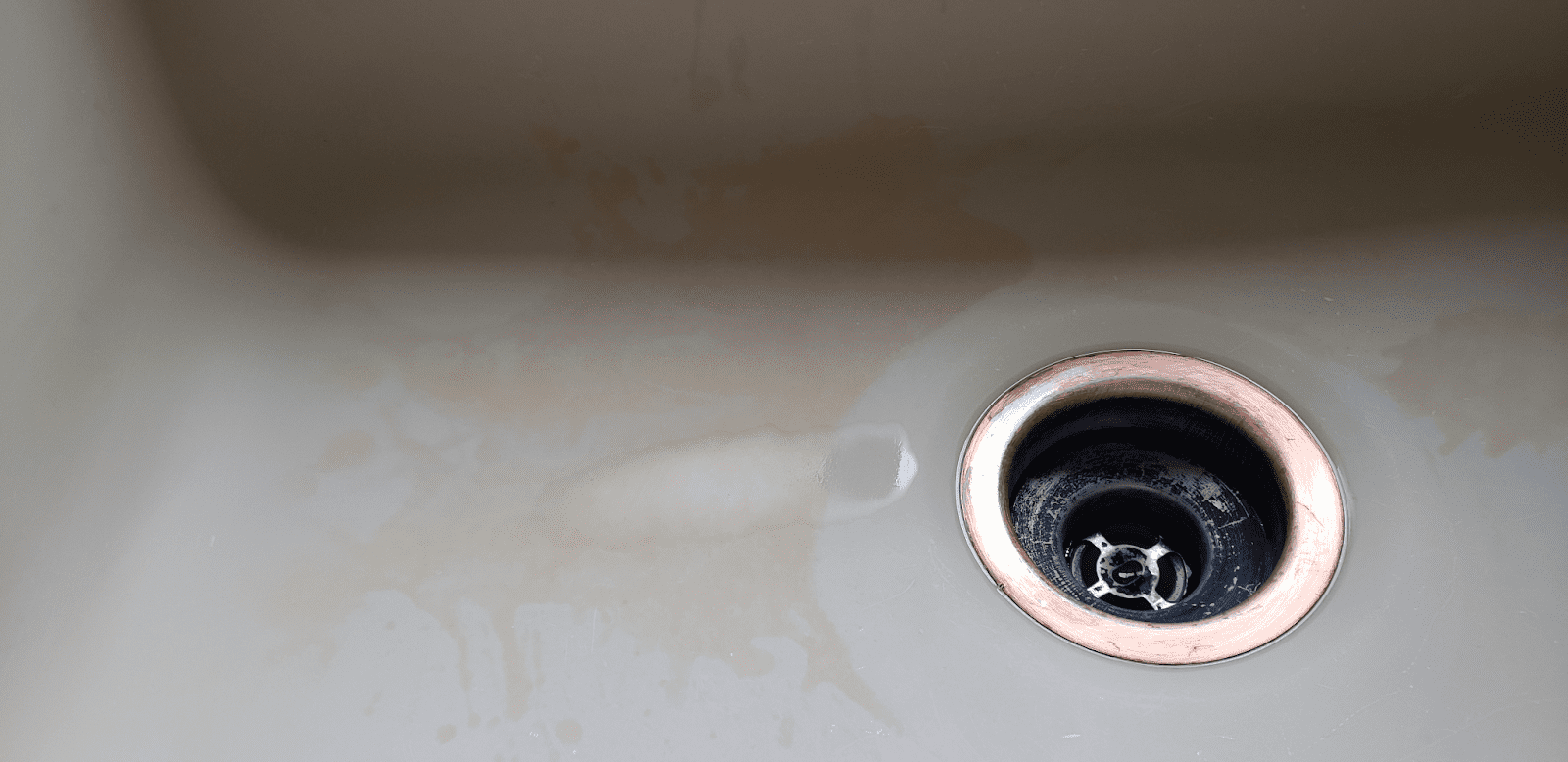
Baking Soda and Vinegar
There are ways to use baking soda and vinegar together. One of them is:
For difficult stains,
- Apply baking soda liberally to difficult stains.
- Prepare a spray bottle with a half-and-half solution of water and vinegar.
- Start by spraying the solution over the baking soda.
- With a soft sponge, begin to scrub the stains in an upward circular motion once the fizzing begins.
- Rinse the sink and remove any traces of baking soda or vinegar.
- And lastly, dry the area.
This baking soda-vinegar method will remove stains from porcelain as well. But, if you have no time and want quick results, use commercial products like the following.
Bar Keeper’s Friend or BKF
Bar Keeper’s Friend soft cleanser is safe and can treat settled stains from a composite sink with minimum effort and less time. It is one of the most recommended cleansers for kitchens and bathrooms.
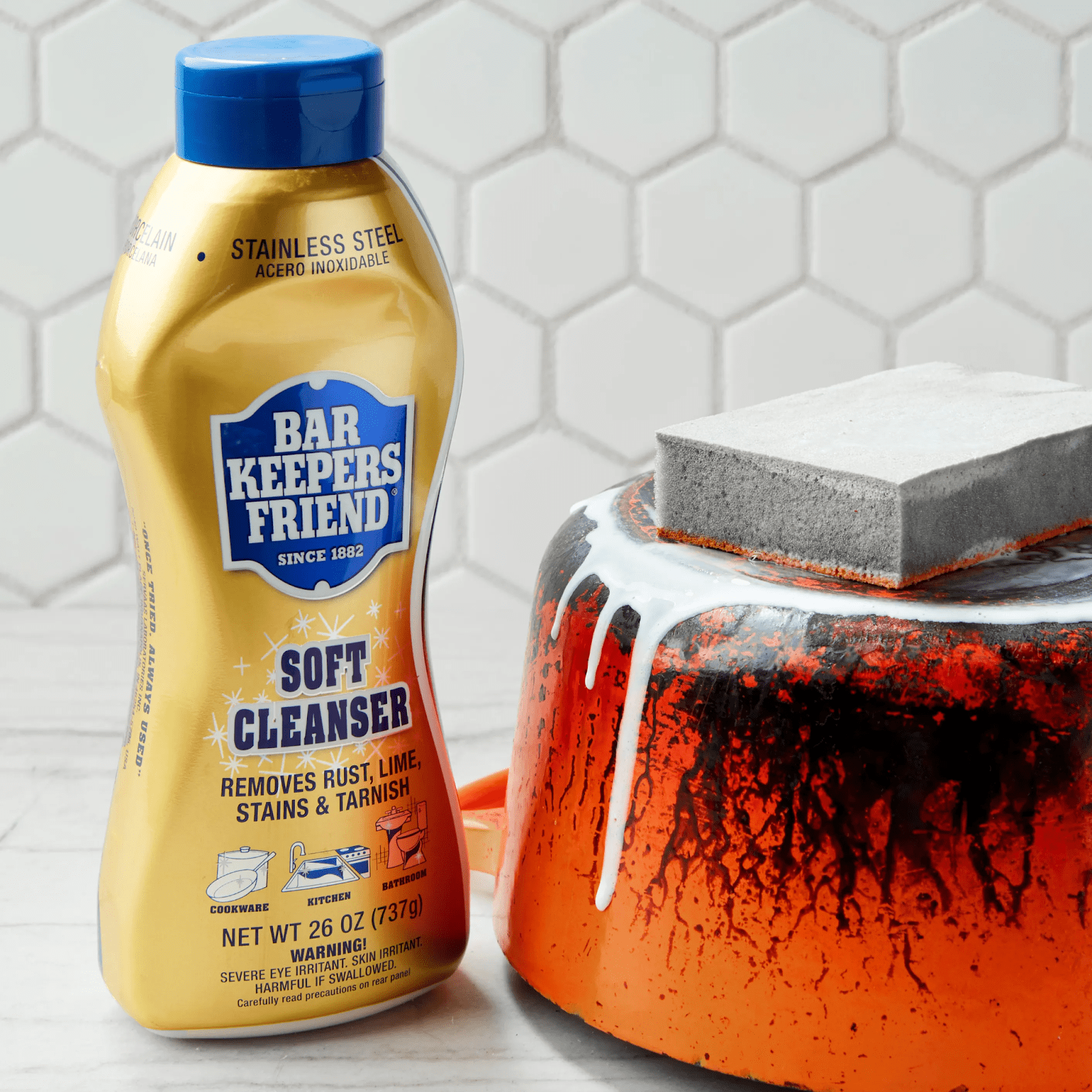
To use BKF,
- Wet the sink and stained area.
- Squeeze some BKF onto the wet-stained area.
- Use a dampened sponge and buff the stains for a minute.
- Within a minute of scrubbing, rinse off the product with plain water.
- Dry the sink with a soft cloth.
Although, if you’re concerned about using a commercial product onto your composite sink, you can use the following method.
Mr. Clean Magic Erasers
A safe and advised item to clean a granite composite sink is Magic Erasers by Mr. Clean. These erasers work amazingly on the sink’s surface and are non-toxic.
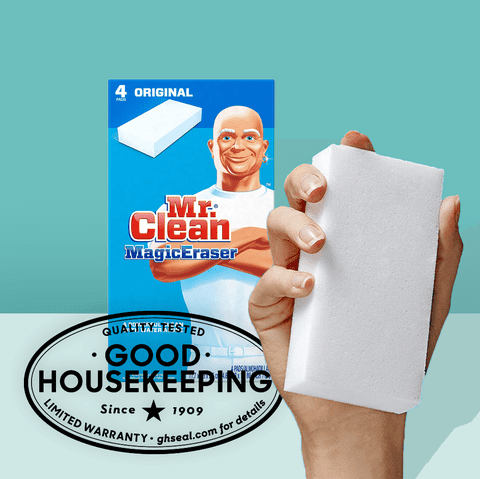
To avoid scratching and clean stains,
- Wet the magic eraser thoroughly and squeeze out the excess water.
- And simply, start erasing the stains.
- Once the stains are gone, rinse the sink with clean water.
For Limescale/ Hard Water Deposits
Another major drawback of having composite sinks is limescale. Composite sinks are more likely to develop limescale or hard water deposits and form a white, cloudy haze on the sink surface. To get rid of these deposits, try the following methods.
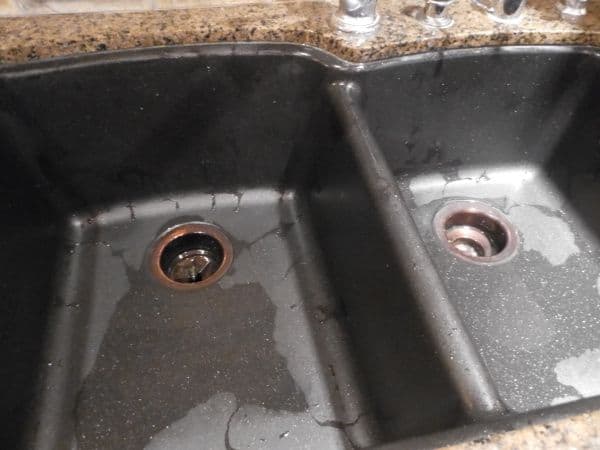
White Vinegar Solution
To begin with,
- Fill a spray bottle, half with water and half with white vinegar.
- Spray the solution thoroughly over the limescale deposits.
- Clean the sink with water after waiting a few minutes
- Dry the sink entirely.
- To remove the white haze, you can use a nylon brush to rub the stain.
Lime-A-Way
You can also use limescale removers available at your hardware stores, such as Lime-A-Way. It comes in a spray bottle. Therefore, to use Lime-A-Way,
- Simply spray the product over the visible hard water deposits.
- Take a soft sponge or a lint-free cloth and gently scrub the product.
- After the limescale gets lifted, rinse the sink with clear water and wipe dry.
Tip -Lime-A-Way also helps treat rust along with lime and calcium deposits from your composite sink.
For Stubborn Stains
Even after using all of the above methods, the stains are persistent. It is time to use a stronger solution –water and bleach solution.
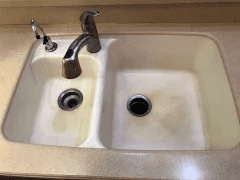
Solution of Water and Bleach
Generally, using bleach to clean composite sinks is not advised. However, if the stains have settled or are getting darker by day, you can use this diluted solution to treat these stains.
For best results,
- Start by combining equal portions of water and bleach. For instance, take a bowl and add ½ cup bleach and ½ cup water.
- Take a soft-bristled or nylon brush and dip it in the solution.
- Start buffing up the stain with the brush.
- Rinse the sink well with water as soon as the stains get lifted.
- And dry the sink. Remove any traces of bleach using running water.
For Deep Cleaning
Ideally, every month, composite sinks should be deep cleaned. For this, you can use the baking soda and vinegar method, like we did while cleaning stains.
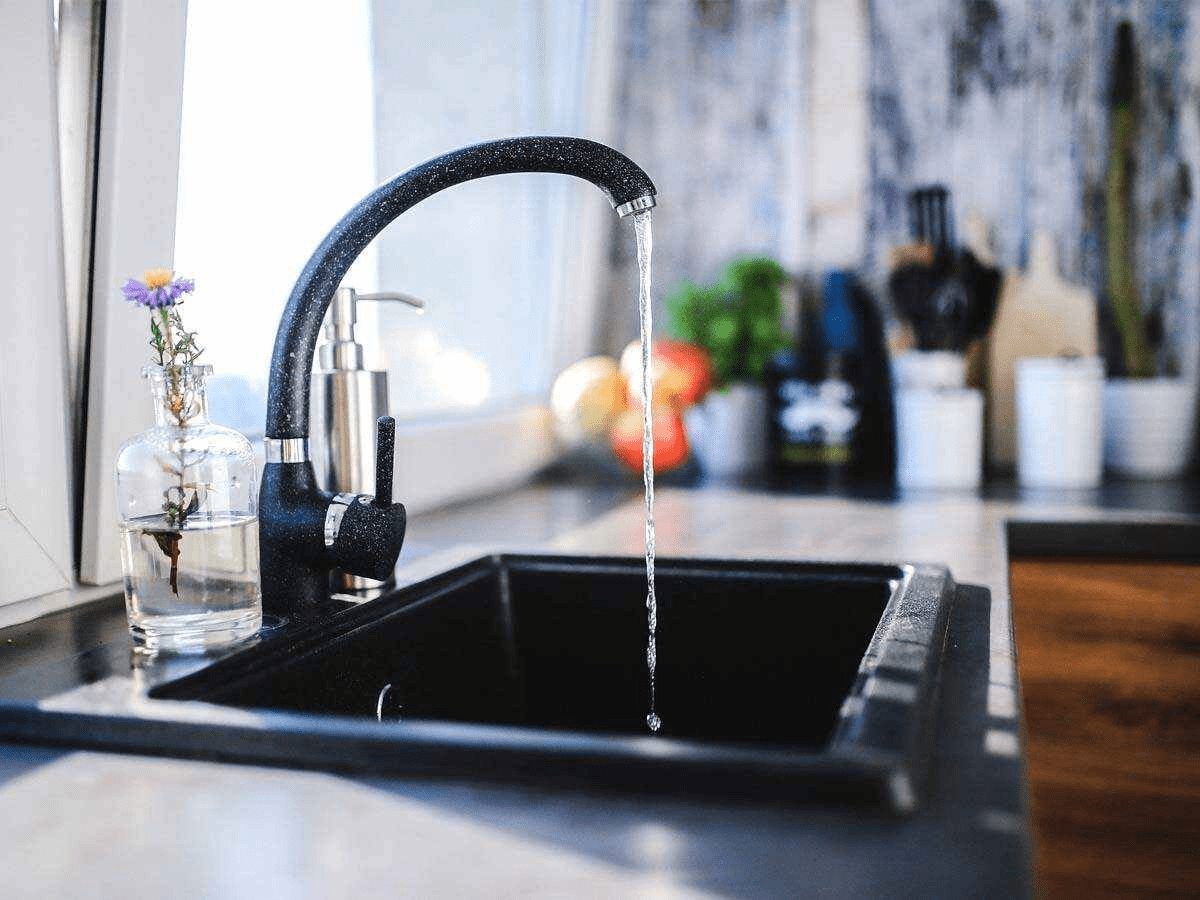
Deep cleaning takes place in five steps.
- Cleaning -Use soap and water.
- Scrubbing -Use the baking soda and vinegar method.
- Rinsing -Rinse the sink with clean and plain water.
- Drying -wipe the sink dry with a lint-free cloth.
- Sealing -use mineral oil to seal the composite sink surface.
Seal the Composite Sink
For restoring the shine and protecting the sink, there is a step that you can use after cleaning the sink with any of the cleaning methods. The last step of every cleaning method should be to use mineral oil.
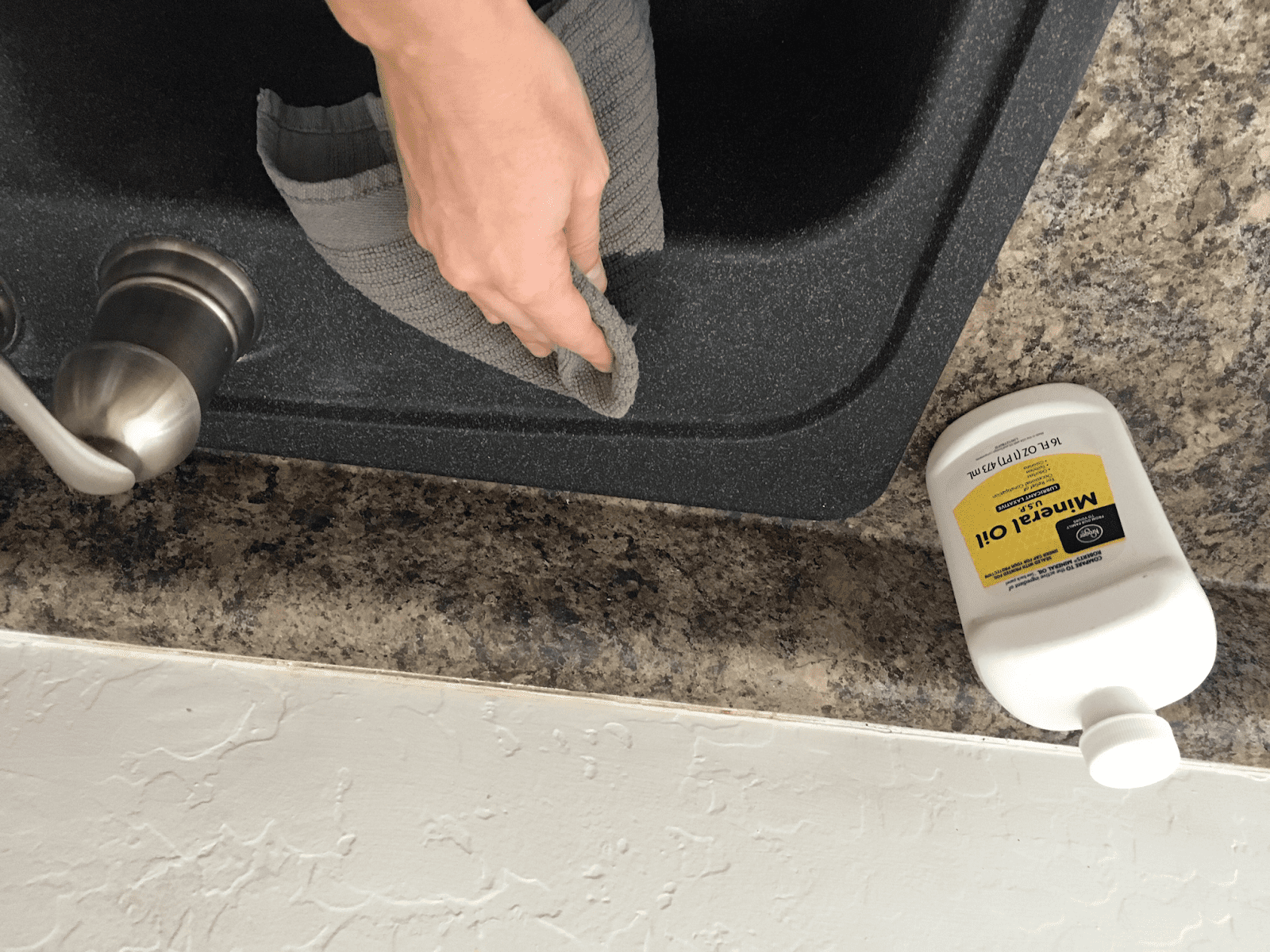
- Apply a tablespoon of mineral oil to a sponge or soft cloth or pour some amount of oil directly into the sink.
- And gently rub it in a circular motion.
- Make sure the entire sink is covered.
- Once you’re done, wait for a minute before wiping the mineral oil.
Bonus tip -Alternatives to mineral oil are olive oil or vegetable oil.
Check out the video for before and after results.
Meta description -Learn the proper ways to clean composite sinks. Read this article to know solutions to clean any possible stains from your granite composite sink or quartz composite sink.
![Granite Vs. Marble Vs. Quartz Countertops [12 Differences+Pros & Cons] Granite Vs. Marble Vs. Quartz Countertops [12 Differences+Pros & Cons]](https://houseadorable.com/wp-content/uploads/2022/03/quartz-marble.jpg)
![What Are Kitchen Sinks Made Of ? [13 Types+Pros & Cons] What Are Kitchen Sinks Made Of ? [13 Types+Pros & Cons]](https://houseadorable.com/wp-content/uploads/2022/01/Sink-MAterial.jpg)
![How To Clean Grease Off Laminate Kitchen Cabinets? [Full Guide] How To Clean Grease Off Laminate Kitchen Cabinets? [Full Guide]](https://houseadorable.com/wp-content/uploads/2022/06/cleaning-cabinets-cover.jpg)
![Granite vs. Laminate Countertop [Pros and Cons+10 Key Differences] Granite vs. Laminate Countertop [Pros and Cons+10 Key Differences]](https://houseadorable.com/wp-content/uploads/2022/03/Granite-vs.-Laminate.jpg)
![Granite vs. Quartz Countertops [Pros & Cons+6 Key Differences] Granite vs. Quartz Countertops [Pros & Cons+6 Key Differences]](https://houseadorable.com/wp-content/uploads/2022/01/Copy-of-HouseAdorable.com-1.jpg)
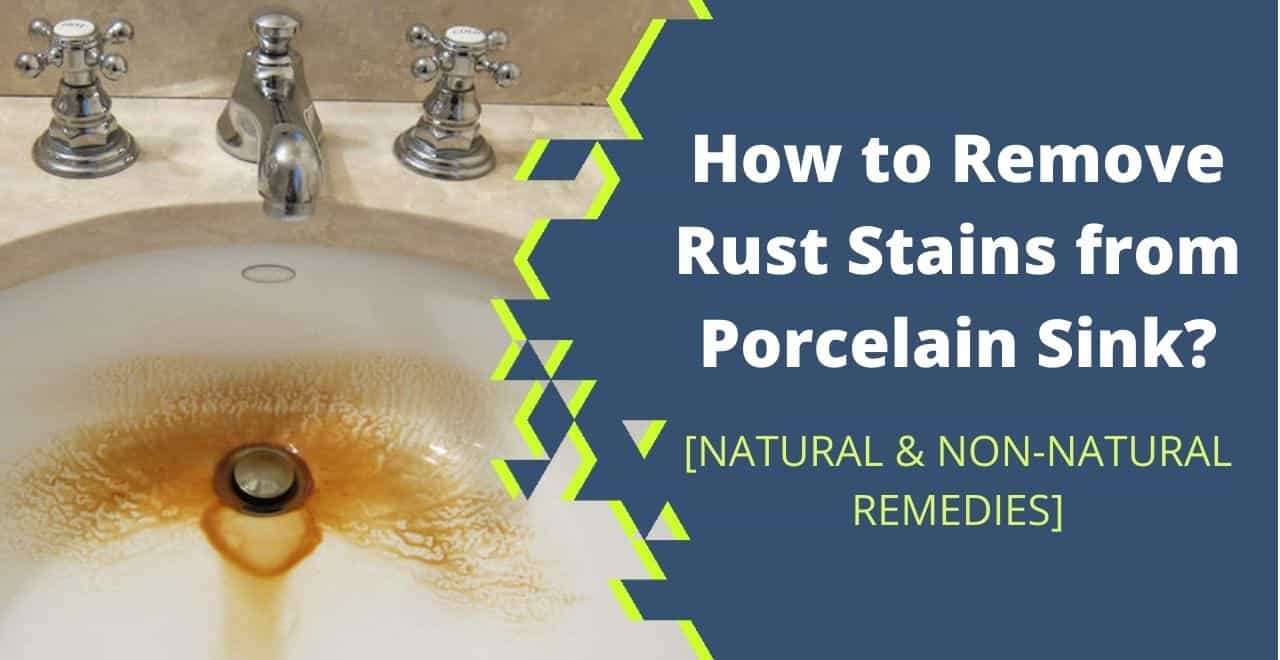

![How to Remove Hard Water Stains from Porcelain Sinks? [13 Ways] How to Remove Hard Water Stains from Porcelain Sinks? [13 Ways]](https://houseadorable.com/wp-content/uploads/2021/12/hardwater-stain-porcelin.jpg)